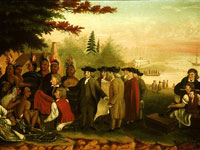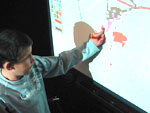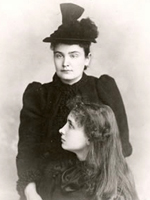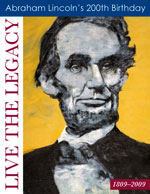Interactive whiteboards (IWBs for short) have certainly changed what classrooms look like today. However, an IWB is only revolutionary when teachers know how to unlock the board's potential. There are a number of simple ways to engage students with the IWB in a history classroom.
Categorization Activity
One quick way to use the IWB is through a categorization activity, in which students come to the board to drag and drop words into appropriate categories, or at least justifiable ones. One could type up a list of causes of the Civil War as individual textboxes and have students manipulate them into the appropriate "social," "political," or "economic" column. I have used these simple categorization activities often, as I find it helps students better plan their writing. In addition, by having students gather around the IWB for this exercise, it fosters meaningful conversation around student classification. If you have a bit more prep time and words/phrases only belong in one specific column in your classification exercise, you can use layering of text and background to have text boxes disappear when dragged into an incorrect column.
Chronology Activity
[. . . A]n IWB is only revolutionary when teachers know how to unlock the board's potential.
Another simple IWB activity is to have students drag listed events onto a timeline in chronological order. This simple idea can help students drill chronology, as I know this is a frequent gap in student's understanding of history today. Again, by using the IWB software's layer feature, students can see instantaneously if they have the event in the right spot.
Wordsplash Activity
Any excuse to get students up and interacting with their classmates and the IWB is worthwhile. In the beginning of a unit or lesson, have students come up to the board to write down the words they associate with "World War I" or whatever the unit or lesson may be on.
Interacting with Text
Place primary source text on the IWB and have students highlight the main idea, or write reactions/questions in the margins. This activity encourages students to interact with primary sources and ask questions of text, something students must do to think like a historian.
Students could also use the IWB to review a cloze passage. The cloze passage could be projected with the answers blocked out. Students would then approach the board to guess as to the correct word and "rub and reveal" the correct answer lying beneath the color block. IWB software tools allow you to write text, layer text, and lock text so that when a student uses the eraser function, he/she reveals the correct answer beneath.
Analyzing Images
Any excuse to get students up and interacting with their classmates and the IWB is worthwhile.
Projecting images on an IWB opens up a number of activity possibilities. Simply having students highlight important symbols in a piece of propaganda or political cartoon may be useful. Another idea is to place tiles over an image to have students come up to the board to slowly reveal the image and hypothesize about what it shows. Another way to get students interacting with the IWB and hypothesizing about images is by using the spotlight tool that comes with most software packages. Using the spotlight tool you, or the students, can reveal select elements of an image to eventually make a meaningful interpretation of the image as a whole. See a Zoom-In Inquiry in action.
Review Activities
With an IWB in the classroom, students are often itching to get a chance to use the pen and interact with it. A simple review game of Pictionary gives students a chance to draw on the board and review key terms. In addition, online quiz sites, such as Quizlet.com offer digital flashcards and review games made more fun when played on the IWB.




